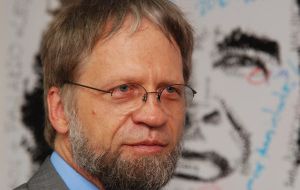MercoPress. South Atlantic News Agency
Colombians faithful to Uribe but seem ready for a “green” change
 Antanas Mockus surprised at his own success with the Greens
Antanas Mockus surprised at his own success with the Greens Colombia goes to the polls Sunday in unusual circumstances for its recent history, with a technical tie between the top two presidential candidates who lead the pack of six contestants.
Outgoing President Alvaro Uribe, 57, a conservative, is set to leave in an enviable position after almost eight years in office: he has a sustained popularity rating of close to 75% cent among Colombians.
According to opinion polls, Uribe, who has built his reputation on an unrelenting fight against Marxist oriented guerrillas and unscrupulous drug cartels would easily win Sunday's election if given the chance.
And yet the ruling coalition was abruptly awoken from this dream when the country's constitutional court rejected in March Uribe's attempt to change the constitution in order to seek a further term in office. He had already convinced lawmakers to change the law to allow him to seek a second presidential term four years earlier.
Uribe's candidate in Sunday's election, his former defence minister Juan Manuel Santos, is busy trying to salvage the dream of a third consecutive “Uribista” presidency and keep his party from being relegated to the opposition.
Although Santos, 58, comes from one of Colombia's wealthiest and most powerful families, he lacks Uribe's charisma, and he has been stagnating in opinion polls for six months with about 35% of first-round vote intention. If elected, he has vowed to pursue further Uribe's determined fight against the rebels as well as his business-friendly economic policies.
Over the same period, independent candidate Antanas Mockus, a green centrist, caught up with Santos, and the two appear to be technically tied even beyond Sunday's vote.
If, as opinion polls predict, no candidate obtains more than half the votes this week, there will be a runoff between the top two finishers on June 20. In such a face off, opinion polls show that Santos and Mockus would again be tied, although experts stress Mockus' potential for uniting the opposition.
Mockus, 58, a philosopher, mathematician and professor as well as a two-time former mayor of the Colombian capital Bogota (1995-7, 2001-3), is ideologically complex. Some media portray him as a “green,” but he only agreed to become the Green Party candidate in October, and the party would doubtless be lost without him.
Mockus is leading a movement that places itself at the centre of the political spectrum, with an emphasis on education, the rule of law and democratic values.
Environmental protection does come up in its programme, but more or less as it does in every other party's.
Mockus, the son of Lithuanian immigrants, made a name for himself within Colombia and beyond as mayor of Bogota. His rise to prominence rested both on relatively successful policies and on Mockus' own eccentricities.
He cycled to work, once appeared before surprised employees in a superhero costume and got married in a circus, where he entered the stage on an elephant. Moreover, he once pulled down his pants and showed startled students his bare buttocks.
Such an attitude apparently did not harm him. Quite the opposite: he is at his most popular among young voters from educated backgrounds who have access to the Internet. The web is indeed one of his most powerful campaign tools.
Mockus is regarded as an extremely honest, direct and law-abiding man. For many Colombians, the latter characteristic in particular sets him apart from the outgoing Uribe.
Under Uribe, the country has seen major scandals but few have been proved in court. The most dangerous for Uribe could be the probe into the alleged complicity of politicians in his coalition with the death squadrons of the paramilitaries.
But under Uribe Colombia has regained the initiative in fighting Marxist guerrillas and the drug lords that finance them. His government achieved some major coups in the internal war, has recovered control over most of its territory and has the guerrilla on the run, with strong military hardware support from Washington. This position has alienated him from neighbouring Venezuela and Ecuador.
The hard line approach or “democracy with security” has endeared him with Colombians that have also seen crime in major cities (and kidnapping) fall drastically.
On the economic front he opened the economy, promoted the private sector and encouraged foreign investment that has enabled Colombia to have a sustained growth performance.




Top Comments
Disclaimer & comment rulesCommenting for this story is now closed.
If you have a Facebook account, become a fan and comment on our Facebook Page!